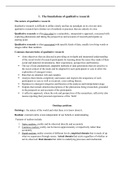Summary
summary Qualitative Research Practice second edition, chapter1,2,3,5,6,7
- Course
- Institution
- Book
an extensive summary of chapter 1,2,3,5,6,7 of the book qualitative research practice Jane Lewis 2nd edition that has been put together with the utmost care to successfully pass your exam.
[Show more]




